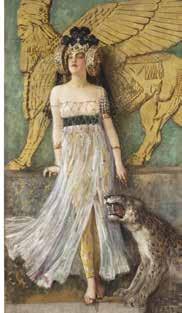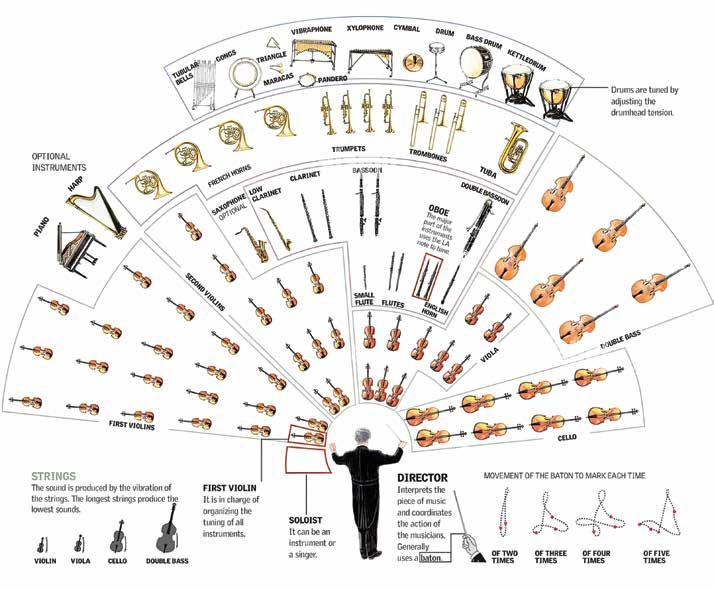
JUNE 20 - AUGUST 1, 2024


JUNE 20 - AUGUST 1, 2024
okofiev
ostakovich
haikovsky
yne
tiz
ores sop olst allas
ew York
iladelphia neria
arlosMiguelPrieto
nnick
bioLuisi
ugustinHadelich
laryHahn
remyDenk
nneMarieMcDermott
ccini
eethoven
U P P J H Y C V N A U W H I A A Y S P O D P A M
D C R H E G H C E G H P C D R I Q A W U Z J L G
R W X O K R Z O I N K C E O U A V I
Prokofiev
Shostakovich
Tchaikovsky Clyne Ortiz
Flores Alsop
Holst Dallas New York Philadelphia Mineria
Carlos Miguel Prieto Yannick
Fabio Luisi
Augustin Hadelich
Hilary Hahn
Jeremy Denk
Anne Marie McDermott Puccini
Beethoven


Thursday, June 20 6:00PM
GERALD R. FORD AMPHITHEATER
Carlos Miguel Prieto, conductor
Anne-Marie McDermott, piano
BEETHOVEN Piano Concerto No. 3
BEETHOVEN Symphony No. 3, Eroica

Beethoven became completely deaf at the age of 44
If Beethoven couldn’t hear, how did he write music?
Beethoven had heard and played music for the first three decades of his life, so he knew how instruments and voices sounded and how they worked together. His deafness was a slow deterioration, rather than a sudden loss of hearing, so he could always imagine in his mind what his compositions would sound like.
Beethoven’s housekeepers remembered that, as his hearing got worse, he would sit at the piano, put a pencil in his mouth, touching the other end of it to the soundboard of the instrument, to feel the vibration of the note.
Source: ClassicFM.com




Sunday, June 23 6:00PM
GERALD R. FORD AMPHITHEATER
Carlos Miguel Prieto, conductor Pacho Flores, trumpet
Héctor Molina, cuatro
GABRIELA ORTIZ Clara GINASTERA Variaciones Concertantes
PAQUITO D’RIVERA Concierto Venezolano
ARTURO MÁRQUEZ Danzón No. 2
PACHO FLORES Cantos y Revueltas
The cuatro is a family of Latin American string instruments played in Colombia, Puerto Rico, Venezuela, and other Latin American countries. It is derived from the Spanish guitar. Although some have viola-like shapes, most cuatros resemble a small to mid-sized classical guitar. In Puerto Rico and Venezuela, the cuatro is an ensemble instrument for secular and religious music and is played at parties and traditional gatherings.






Saturday, June 29 6:00 PM
GERALD R. FORD AMPHITHEATER
Fabio Luisi, conductor
Jeremy Denk, piano
ANNA CLYNE ATLAS for Piano and Orchestra
(Co-Commission with the Dallas Symphony Orchestra)
TCHAIKOVSKY Symphony No. 5
Questions?
Which elements of nature does the music remind you of?
Do you hear any particular animals in the music?
Sometimes music makes us think of colors - which colors do you hear in the music?
Music can also make you feel lots of different emotions like sadness, anger, frustration, joy, happiness, celebration. Which emotions do you feel in each piece? There’s no wrong answer and there may be many emotions.




Saturday, July 6 6:00PM
GERALD R. FORD AMPHITHEATER
Marin Alsop, conductor
The Evans Choir (Catherine Sailer, director)
REENA ESMAIL RE|Member
COPLAND Appalachian Spring
HOLST The Planets
1. Mars the Bringer of War
2. Venus the Bringer of Peace
3. Mercury . . . the Winged Messenger
4. Jupiter the Bringer of Jollity
5. Saturn the Bringer of Old Age
6. Uranus . . . the Magician
7. Neptune the Mystic





Wednesday, July 17 6:00PM
GERALD R. FORD AMPHITHEATER
Jaap van Zweden, conductor
Hilary Hahn, violin
BEETHOVEN Violin Concerto in D major
COPLAND Symphony No. 3
The “voice” or sound of a violin depends on its shape, the wood it is made from, the graduation (the thickness profile) of both the top and back, the varnish that coats its outside surface and the skill of the luthier in doing all of these steps. The varnish and especially the wood continue to improve with age, making the fixed supply of old well-made violins built by famous luthiers much sought-after.
- Sotakeit. Adapted from Wikipedia, Wikimedia Commons





Learn to play an instrument very well.
Love music.
To become a conductor, you must have a love of music and its possibilities. Esa-Pekka Salonen, the principal conductor of the Philharmonia Orchestra in London, recommends that, “You have to love the music more than you love yourself in a way.” Being a conductor is about presenting music in a way that you interpret and essentially your orchestra is your instrument. Like musicians who can channel their feelings into their playing, an aspiring conductor needs to love music so much that they can effectively communicate their ideas to the group.

Get an education.
Conductors need, at the minimum, a bachelor’s degree in arts (BA), although many professional positions require a master’s (MA).
In addition, there are other aspects involved in a conducting career. Because you will be working with people, you need to know how to effectively communicate and inspire. Necessary skills include:
• Group dynamics and group psychology
• Leadership skills
• Strong grasp of music language
Get experience.
Go to rehearsals. Esa-Pekka Salonen explains that “...the best education for someone who wants to become a conductor is to sit in rehearsals.” You’ll see what makes a performance and observe how conductors make it happen.
Listen to classical music. As much as possible, explore all types of music, but familiarizing yourself with classical pieces (performed by different orchestras) will help you develop your own ideas about how the music should be performed.
Be flexible and open to all sorts of opportunities.
Adapted from the Publication by String Ovation Team on January 10, 2017


Tuesday, July 23 6:00PM
GERALD R. FORD AMPHITHEATER
Santtu-Matias Rouvali, conductor
Augustin Hadelich, violin
ROSSINI Semiramide Overture
SHOSTAKOVICH Violin Concerto No. 1
PROKOFIEV Symphony No. 5
Overture (from French ouverture, literally, “opening”) is a music instrumental introduction to a ballet, opera, or oratorio in the 17th century. During the early Romantic era, composers such as Beethoven and Mendelssohn composed overtures that were independent, self-existing, instrumental, programmatic works that foreshadowed genres such as the symphonic poem. These were “...at first undoubtedly intended to be played at the head of a programme”. -Source: Wikipedia

Semiramide is an opera set in ancient Babylon, where the queen of the same name has to choose a successor and a husband for Princess Azema. However, Semiramide is haunted by the murder of her husband King Ninus, which she committed with her lover Assur. She also hopes to find her long-lost son Ninia, who was believed to be killed in the conspiracy. The opera involves political intrigue, mistaken identity, divine intervention, and revenge. -Rossini Opera Festival
-Met Opera Festival










